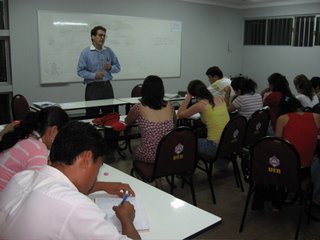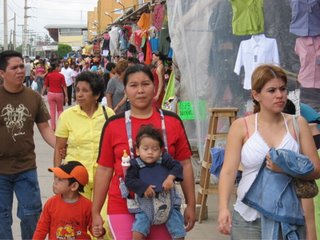true that water forms a vortex in the opposite direction
south of the equator as compared to the north. So I
did an empirical study of the question in my shower
this morning. Conclusion: the vortex here
is definitely inconsistent. Turns out that the force of gravity is so slight anywhere in the world that it can´t affect which direction water flows in your sink.

However, a lot of things are upside down. It’s spring here.
The trees are in bloom and the city looks pretty in
places. It gets quite hot in December and January,
and it’s the rainy season then. When we get
cold-weather fronts, they come up from the south,
from Argentina.
I’ve heard people here lament that Latin Americans
are very bad at foreign languages because they can go
all over the continent and speak Spanish. Like North
Americans, they don’t feel as much pressure to learn
a foreign language as, say, Europeans do.
*****
It’s also true that indigenous peoples are a much
bigger force here than in North America. The
Mexican writer Octavio Paz says this is because the northern
indigenous tribes were mainly nomadic. The English
and later immigrant groups just pushed them to the
West, and then moved them into isolation on
reservations. The Protestant religion didn’t fit
well with native beliefs.
In South America, Paz says, the indigenous people
were more settled in farming communities. They couldn’t
and wouldn’t be pushed aside. The Spanish used them
to work their mines and plantations and mixed in with
them. The Spanish brought with them a Catholic
religion whose many saints and images fit well with
the polytheism of the indigenous people. The
Catholic rituals and beliefs and stories surrounding the
Blessed Virgin Mary were a particularly powerful
fit.
The local daily El Nuevo Dia on Friday published a
centerfold pullout section that showed a map of
about 40 native groups extant in Bolivia, along with their
religious beliefs and languages. A website called
ethnologue.com lists 36 native languages spoken in
Bolivia, with most of them representing very small
populations and some nearly extinct. It also lists
seven extinct languages.
Depending on where you get your information
percentages may vary, but it is said that about 30
percent of the population are Quechua, 25 percent
Aymara (including the president), 30 percent mestizo
(mixed) and 15 percent white. But I find this kind
of categorization confusing and inconsistent. It
doesn’t seem to allow any space in its tally for all of the
other ethnic and language groups.
****
People are used to not having their voices heard
here, so the most popular way of getting the government
and public officials to pay attention is not to call
your congressman but to set up a roadblock on a main
artery, called a bloqueo. You throw tires and wood
into the road and set them on fire and then you
attack anyone who tries to go around it. In a country with
a shortage of good roads, this can bring everything to
a halt. In the past week, in the city of Santa Cruz,
residents of some neighborhoods whose streets
haven’t been paved blocked all traffic on one of the major
ring roads. Generally, police and the military
don’t try to break these things up. It can lead to
violent confrontations. In the prefecture of Santa Cruz,
which includes a huge area of the country, rural teachers
staged a work stoppage yesterday because they’re
upset with the prefect’s refusal to appoint a new head of
the education ministry who was named by, I think,
the national government. Police in riot gear surrounded
the education adminstration building as the teachers
(!) threw rocks and bottles and broke windows.
Also this week, miners in the mountain region, coca
growers in the fertile valleys and cab drivers in La
Paz all set up bloqueos of main roads to show they
were unhappy with some government policy or other.
Evo Morales’s party regularly calls on the “social
movements” of farm workers, laborers and indigenous
people to “mobilize” and march or form bloqueos,
but the irony is that these demonstrations are making
his government look bad.
It’s an effective way of showing power but not a
very effective way of getting anything done. Many of the
institutions that are supposed to serve the people
are so ineffective and unreliable that there are
elaborate work-around systems.
For example, at the ministry of Migration, where I
have to go to get my visa extended, there are people
camped outside in long lines trying to get passports
to leave for Spain and other countries in search of
work. Some 3,000 people. I told a local official
about it. And he said, let me take care of
it. You pay a fixer (the name for it is tramitedor,
from the word for paperwork), and voila, all is
taken care of. So in a 24-hour period my visa was renewed
for 90 days after I handed off my passport along
with a stack of bolivianos. The fixer costs $40.
There are no mailboxes in this city of 1.3 million
people. If you want to mail a letter, you take it
to the main post office in the center of the city or to
the other post office station near my house which is
often unattended (“she’s in the bathroom” the folks
nearby say) or closed (on Saturdays). It’s my own
fault for not trying to figure out whether I can
just leave letters with Sergio, the building
superintendent, but there is probably an extra fee
involved. I’ve never seen a letter carrier or postal
truck anywhere.

A friend of mine from Baltimore who is an economist
with a sense of humor, Anirban Basu, likes to say
that when the going gets tough for Americans, they go
shopping. And I have to say I lived up to that
on Saturday.
I had heard from a cab driver that you can get good
cheap clothing at a place called Barrio Lindo
(pretty
neighborhood), so I went there today. There must be
a
half-dozen airplane-hangar-sized buildings packed to
the gills with little tiendas selling all kinds of
clothing, shoes, cosmetics, hardware. The place is
unbelievable, in terms of its offerings, which are
pretty good, and its size (enormous) and the number
of
people it attracts. I spent a couple of hours
walking
around and took a couple photos.
Most of the clothes I had brought with me are too
heavy and hot. So I bought four short-sleeve cotton
shirts ($5 apiece), four pairs of lightweight cotton
slacks ($6.50 each), a sturdy pair of Brazilian made
dress shoes ($35), and a belt ($3).
I felt the thrill of shopping that I have heard
women
talk about but have never felt personally. I’m
going
to have to take Cindy to this place.
Next weekend I’m going on a three=day excursion with
members of the Santa Cruz journalists union to just
this side of the Brazilian border, Puerto Suarez,
where we’re going to give workshops to the local
journalists. My piece will be on journalism ethics.
It’s regularly over 100 degrees and very humid
there.
It’s in the Amazon basin. Lots of mosquitoes. I’m
taking my malaria medicine every week. We’re also
doing events in two other cities. I really don’t
know
what to expect, but I’m packing all my mosquito
gear.
Jim:
ReplyDeleteDios mio! I can't believe I hadn't heard about your awesome odyessy before now. I just heard my mom and Aunt Dotsy mention this last weekend.
You're to be commended for taking such a huge risk and re-inventing yourself.
I'm starting with your blog from the first entry, so you may never see this comment, but such interesting (and good) writing deserves commentary.
Regarding the bloqueos and the tramitedores: How did this system of dealing with bureacracies come to be in place do you think? It seems to reinforce some of the stereotypes we hold in Los Estados Unidos about folks of Hispanic origin as corrupt and volatile.
Have you met any tragafuegos? Folks who breathe fire at intersections for tips... I think they're mainly in Mexico.
I have a gazillion other questions about your time there.
Maybe sometime I can buy you a cerveza fria and you can tell me your stories.
Come to Dayton and bring your bike. The riding's great around here...
Fred
pedalin_poet@yahoo.com